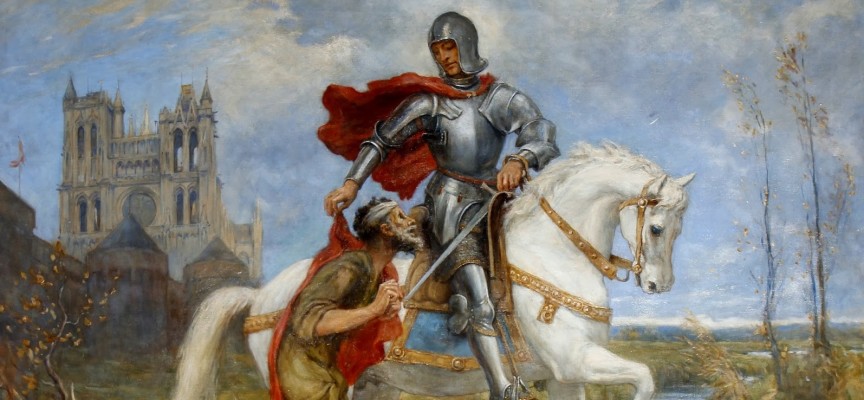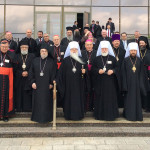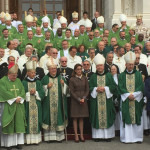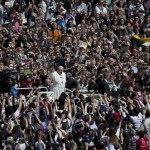On the occasion of the closing of the commemorative year for the 17th centenary of the birth of St. Martin of which the Church celebrates the liturgical memory on November 11, the Ccee Presidency sent a letter to the episcopate and all the people of Hungary in the persons of the President of the Hungarian Bishops’ conference, bishop of Györ, Msgr. András Veres, and the Primate of Hungary, Cardinal Peter Erdo, former president of the Ccee.
On the day the Church celebrates the liturgical memory of Saint Martin, which this year marks the closure of the celebratory year for the 17th centenary of his birth, we would like to unite ourself with the Bishops and all the faithful of Hungary, the native land of this great Saint, in giving thanks to God for the human and spiritual contribution which Saint Martin has given to the continent. A few days away from the end of the Jubilee of Mercy, we cannot but note the happy coincidence with the memory of one of the saints who knew best how to incarnate in his time the merciful face of Christ. The life of Saint Martin tells us that in the encounter with the cold beggar the saint discovered Jesus Christ, was converted and changed his life, putting it no longer at the service of a worldly power but of God. Through this encounter, Christ made Saint Martin capable of living and loving. Obeying the divine call, Saint Martin undertook a path of Christian life which brought him to take care of the poor and the oppressed, to spread the Gospel with courage, to combat the errors of his time, to build church communities with the spirit of a pastor, with the sentiments of Christ and the ability to see the world through God’s eyes. Saint John Paul II said that Saint Martin was one of the founders of Western monasticism; he also belongs to that multitude of men who are at the foundations of European culture and civilisation, a reality which is not just a memory, but also a project to build with trust and conviction. The figure and the ministry of Saint Martin testify to the immense human, cultural and spiritual contribution which Ccee Christianity has offered to Europe. The continent is heir of Saint Martin, of those men and women, like him, who are at the foundation of European humanism. In our time, too, it is essential to remember that the Christian life unites the profundity of prayer, community life, the proclamation of the Gospel, attention and dedication to the poor and to those who suffer. We thank God for the radiant witness of Saint Martin, who contributed to keeping alight the flame of the Christian faith in the world. Uniting with the Hungarian Bishops, Ccee asks the Lord for the grace to raise up new European saints who might live out Mercy and witness to it in their personal and community lives. Today Europe and the world have a need of “a Church rich in witnesses”. Only in this way, the Church “will be able to bring back the pure water of the Gospel to the roots of Europe” (Pope Francis, Address on the Conferral of the Charlemagne Prize, 6 May 2016). Following the example of Saint Martin, may we, too, desire to proclaim joyfully that Christ is our life and the everlasting foundation of civilisation and culture”.
In occasione della chiusura dell’anno commemorativo per il 17° centenario della nascita di san Martino, di cui la Chiesa celebra la memoria liturgia l’11 novembre, la Presidenza del Ccee ha inviato una lettera all’episcopato e a tutto il popolo d’Ungheria nelle persone del presidente della Conferenza episcopale ungherese, il vescovo di Györ mons. András Veres, e del primato d’Ungheria, il cardinale Péter Erdő, già presidente del Ccee.
Nel giorno in cui la Chiesa celebra la memoria liturgica di san Martino che quest’anno segna la chiusura dell’anno celebrativo per il 17° centenario della sua nascita, vorremo unirci ai vescovi e a tutti i fedeli dell’Ungheria, terra natia di questo grande Santo, nel rendere grazie a Dio per il contributo umano e spirituale che san Martino ha dato al continente. A qualche giorno della chiusura del Giubileo della Misericordia, non possiamo non notare la felice coincidenza con la memoria di uno dei santi che meglio seppero incarnare nel loro tempo il volto misericordioso di Cristo. La vita di san Martino ci dice che nell’incontro con il mendicante infreddolito il santo scoprì Gesù Cristo, si convertì, cambiò vita, mettendola non più al servizio di un potere mondano ma di Dio. Con questo incontro, Cristo rese san Martino capace di vivere e di amare. Obbedendo alla chiamata divina, san Martino intraprese un itinerario di vita cristiana che lo portò a prendersi cura dei poveri e degli oppressi, a diffondere il Vangelo con coraggio, a combattere gli errori del suo tempo, a edificare le comunità ecclesiali con spirito di pastore, con i sentimenti di Cristo e la capacità di vedere il mondo con gli occhi di Dio. San Giovanni Paolo II affermò che san Martino fu uno dei fondatori del monachesimo occidentale; egli appartiene anche a quella schiera di uomini che sono a fondamento della cultura e della civiltà europea, realtà che non è soltanto una memoria, ma anche un progetto da costruire con fiducia e convinzione. La figura e il ministero di san Martino testimoniano l’immenso contributo umano, culturale e spirituale, che il cristianesimo ha offerto all’Europa. Il continente è erede di san Martino, di quegli uomini e di quelle donne, che come lui, sono alla base dell’umanesimo europeo.
Anche nel nostro tempo è necessario ricordare che la vita cristiana unisce la profondità della preghiera, la vita comunitaria, l’annuncio del Vangelo, l’attenzione e la dedizione ai poveri e a quanti soffrono. Noi ringraziamo Dio per la luminosa testimonianza di san Martino, che ha contribuito a mantenere accesa la fiaccola della fede cristiana nel mondo.
Unendosi ai vescovi ungheresi, il Ccee chiede al Signore la grazia di suscitare nuovi santi europei che possano vivere la Misericordia e testimoniarla nella loro vita personale e comunitaria. L’Europa e il mondo hanno oggi bisogno di “una Chiesa ricca di testimoni”. Solo in questo modo la Chiesa “potrà ridare l’acqua pura del Vangelo alle radici dell’Europa” (papa Francesco, Discorso per il Premio Carlo Magno, 6 maggio 2016). Sull’esempio di san Martino, anche noi vogliamo annunciare gioiosamente che Cristo è la nostra vita e il perenne fondamento di civiltà e cultura”.
San Martino, un visage de l’humanisme européen
A l’occasion de la clôture de l’année commémorative du 17e centenaire de la naissance de Saint-Martin, dont l’Eglise célèbre la mémoire liturgique le 11 Novembre, la Présidence du Ccee a envoyé une lettre à l’épiscopat et tout le peuple de Hongrie en personnes du président de la conférence épiscopale hongroise, évêque de Györ, Mgr. András Veres, et le Primat de la Hongrie, le cardinal Peter Erdö, ancien président du Ccee.
En ce jour où l’Eglise célèbre la mémoire liturgique de Saint-Martin qui, cette année, marque également la clôture de l’année de célébration du XVIIe centenaire de sa naissance, nous souhaitons nous joindre aux évêques et à tous les fidèles de Hongrie, terre où naquit ce grand Saint, pour rendre grâce à Dieu pour la contribution humaine et spirituelle que Saint-Martin sut apporter au continent. A quelques jours de la conclusion du Jubilé de la Miséricorde, nous ne pouvons éviter de constater l’heureuse coïncidence avec la mémoire de ce Saint qui, plus que tout autre, à son époque, fut en mesure d’incarner le visage miséricordieux de Jésus-Christ. La vie de Saint-Martin nous raconte que lors de la rencontre avec le mendiant transi, le Saint découvrit le visage de Jésus-Christ, décida de se convertir, de changer de vie, en la mettant au service de Dieu et non plus d’un pouvoir mondain. Par cette rencontre, Jésus-Christ rendit Saint-Martin capable de vivre et d’aimer. En obéissant à l’appel divin, Saint-Martin entreprit un itinéraire de vie chrétienne qui l’a conduit à prendre soin des pauvres et des opprimés, à répandre l’Évangile avec courage, à lutter contre les erreurs de son époque, à construire une communauté ecclésiale avec l’esprit d’un pasteur, avec les sentiments de Jésus-Christ et la capacité de voir le monde par les yeux de Dieu. Saint Jean Paul II a affirmé que Saint-Martin a été l’un des fondateurs du monachisme occidental : il appartient à ce groupe d’hommes qui constituent le fondement de la culture et de la civilisation européenne, une réalité qui n’est pas seulement une mémoire, mais qui est aussi un projet à construire avec confiance et conviction. Le profil et le ministère de Saint-Martin témoignent l’immense contribution humaine, culturelle et spirituelle, que le christianisme a offert à Ccee l’Europe. Le continent est héritier de Saint-Martin, de ces hommes et de ces femmes qui, comme lui, sont à la base de l’humanisme européen. De nos jours, il est également nécessaire de faire mémoire du fait que la vie chrétienne unit la profondeur de la prière, la vie communautaire, l’annonce de l’Évangile, l’attention et le dévouement envers les pauvres et envers tous ceux qui souffrent. Nous remercions le Seigneur pour le témoignage éclatant de Saint-Martin, qui a contribué à alimenter la flamme de la foi chrétienne dans le monde. Le Ccee, de concert avec les évêques hongrois, demande au Seigneur la grâce de susciter de nouveaux saints européens qui puissent vivre la Miséricorde et la témoigner dans leur vie personnelle et communautaire. Aujourd’hui l’Europe et le monde ont besoin d’« une Église riche de témoins ». Seulement de cette façon, l’Église « pourra redonner l’eau pure de l’Évangile aux racines de l’Europe » (Pape François, Discours pour la remise du prix Charlemagne, 6 mai 2016). Suivant l’exemple de Saint-Martin, nous aussi, nous souhaitons annoncer dans la joie que Jésus-Christ est notre vie et le fondement éternel de toutes les civilisations et les cultures.
San Martino, ein Gesicht des europäischen Humanismus
Anlässlich des Sxhlusses des Gedenkjahres zum 17. Jahrestag der Geburt von St. Martin, von denen die Kirche die Liturgie der Erinnerung feiert am 11. November, schickte der Ccee-Präsidentschaft einen Brief an den Episkopat und alle Menschen von Ungarn in Personen des Präsidenten der Konferenz der ungarischen Bischöfe, Bischof von Györ, Msgr. András Veres und dem Primas von Ungarn, Kardinal Peter Erdö, ehemaliger Präsident des Ccee.
An dem Tag, an dem die Kirche in der Liturgie des hl. Martins gedenkt und der in diesem Jahr auch die Feiern zum Jahr der 1700. Wiederkehr seiner Geburt beendet, möchten wir uns den Bischöfen und allen Gläubigen Ungarns, dem Geburtsland dieses grossen Heiligen, anschliessen und Gott für den menschlichen und spirituellen Beitrag danken, der unserem Kontinent mit dem hl. Martin geschenkt wurde. Einige Tage vor Abschluss des Jubeljahrs der Barmherzigkeit können wir nicht umhin festzustellen, welch glücklicher Zufall es ist, dass die Erinnerung an einen der Heiligen, die in ihrer Zeit am besten das barmherzige Antlitz Christi verkörperten, in diesen Zeitraum fällt. Das Leben des hl. Martin erzählt uns, wie der Heilige dem frierenden Bettler begegnete, in diesem Jesus Christus entdeckte, sich bekehrte, sein Leben veränderte und nicht mehr im Dienst der weltlichen Macht, sondern Gottes stehen wollte. In dieser Begegnung ermöglichte Christus dem hl. Martin ein Leben in der Liebe: er folgte dem göttlichen Ruf und schlug einen christlichen Lebensweg ein, der ihn dazu führte, sich der Armen und Unterdrückten anzunehmen, mutig das Evangelium zu verbreiten, die Fehlentwicklungen seiner Zeit zu bekämpfen und christliche Gemeinschaften im Geiste eines Hirten und die Welt mit den Augen Gottes sehend aufzubauen. Der hl. Johannes Paul II. bestätigte, dass der hl. Martin einer der Gründer des westlichen Mönchtums war; er gehört auch in die Reihe der Männer, die die Grundlage der europäischen Kultur und Zivilisation waren – die nicht nur eine vergangene Wirklichkeit, sondern auch ein Projekt darstellen, das noch mit Vertrauen und Überzeugung umgesetzt werden muss. Die Gestalt und das Amt des Ccee hl. Martin zeugen für den ungeheuer grossen menschlichen, kulturellen und spirituellen Beitrag, den das Christentum Europa brachte. Der Kontinent ist Erbe des hl. Martin sowie jener Männer und Frauen, die wie er dem europäischen Humanismus zu Grunde liegen. Auch in unserer Zeit ist es notwendig, daran zu erinnern, dass das christliche Leben das innige Gebet, das gemeinschaftliche Leben, die Verkündigung des Evangeliums, die Aufmerksamkeit und die Hingabe für die Armen und Leidenden in sich vereint. Wir danken Gott für das leuchtende Beispiel des hl. Martin, das dazu beiträgt, die Fackel christlichen Glaubens in der Welt am Leben zu erhalten. Die Ccee schließt sich den ungarischen Bischöfen an und bittet unseren Herrn um die Gnade, damit wir neue europäische Heilige bekommen, die die Liebe in ihrem persönlichen und gemeinschaftlich Leben umsetzen. In Europa und der heutigen Welt brauchen wir „eine Kirche, die reich an Zeugen ist“. Nur auf diese Weise vermag die Kirche „von neuem das reine Wasser des Evangeliums auf die Wurzeln Europas zu geben“ (Rede von Papst Franziskus bei der Verleihung des Karlspreises am 6. Mai 2016). Dem Beispiel des hl. Martin folgend wollen auch wir freudig verkündigen, dass Christus unser Leben und das ewige Fundament unserer Zivilisation und Kultur ist.
Marcin: symbol europejskiego humanizmu
Z okazji zakończenia obchodów 1700 rocznicy urodzin św. Marcina, którego wspomnienie liturgiczne przypada w Kościele katolickim 11 listopada, Prezydium Rady Konferencji Biskupich Europy (Ccee) przekazało na ręce Przewodniczącego Konferencji Episkopatu Węgier bpa Györ Andrása Veresa i Prymasa Węgier kard. Pétera Erdő, byłego Przewodniczącego Ccee, list adresowany do episkopatu i narodu węgierskiego.
W dniu, w którym Kościół obchodzi liturgiczne wspomnienie Św. Marcina, który w tym roku odznacza się uroczystym zamknięciem celebracji 1700-lecia jego narodzin, chcemy zjednoczyć się z Biskupami i wszystkimi wiernymi Węgier, ojczystej ziemi tego wielkiego Świętego, w dziękczynieniu Bogu za jego ludzki i duchowy wkład dla kontynentu. Na kilka dni przed zakończeniem Jubileuszu Miłosierdzia, nie możemy nie zauważyć szczęśliwego “zbiegu okoliczności” we wspomnieniu jednego ze świętych, którzy najlepiej potrafili, urzeczywistniać w swoim czasie miłosierne oblicze Chrystusa. Życie św. Marcina pokazuje nam, że w spotkaniu ze zmarzniętym żebrakiem odkrył on Jezusa Chrystusa, nawrócił się, zmienił swoje postępowanie, oddając się już nie służbie doczesnej władzy, lecz Bogu. Tym spotkaniem, Chrystus czyni św. Marcina zdolnym do nowego życia i do miłości. Posłuszny wezwaniu Boga podejmuje życie chrześcijańskie, które skłania go do troski o biednych i uciśnionych oraz do szerzenia z odwagą Ewangelii; do zwalczania błędów swego czasu a także zbudowania wspólnot kościelnych w duchu pasterskim, w miłości Chrystusowej i umiejętności widzenia świata oczami Boga. Święty Jan Paweł II potwierdził, że św. Marcin był jednym z założycieli monastycyzmu zachodniego. Należy on także do tej grupy ludzi, którzy są fundamentem kultury i cywilizacji europejskiej. Rzeczywistości, która nie jest tylko wspomnieniem, ale również projektem do stworzenia z ufnością i przekonaniem. Postać św. Marcina i jego czyny świadczą o ogromnym wkładzie ludzkim, kulturowym i duchowym, który chrześcijaństwo dało Europie. Ten Ccee kontynent jest spadkobiercą św. Marcina, tych mężczyzn i tych kobiet, które podobnie jak on, stoją u podstaw europejskiego humanizmu. Również w naszych czasach konieczna jest pamięć, że życie chrześcijańskie jednoczy głębia modlitwy, życie wspólnotowe, głoszenie Ewangelii, uwaga i poświęcenie względem biednych i cierpiących. Dziękujemy Bogu, za światło świadectwa św. Marcina, który przyczynił się do utrzymania zapalonej pochodni wiary chrześcijańskiej w świecie. Jednocząc się z Biskupami Węgier, Ccee prosi Boga o łaskę wskrzeszenia nowych świętych europejskich, którzy potrafią żyć Miłosierdziem i świadczyć o Nim w życiu osobistym i wspólnotowym. Europa i świat potrzebują “Kościoła bogatego w świadków”. Tylko w ten sposób Kościół “może dać czystą wodę Ewangelii korzeniom Europy.” (Papież Franciszek, Przemówienie po otrzymaniu nagrody Karola Wielkiego, 6 maja 2016). Za przykładem św. Marcina, także my, pragniemy głosić z radością, że Chrystus jest naszym życiem i stałym fundamentem cywilizacji i kultury.
Latest posts by EURCOM (see all)
- What are the aims of the European security and defence policy? - 12 aprile 2017
- The Church is for the European project - 28 marzo 2017
- A message for Europe - 28 marzo 2017











